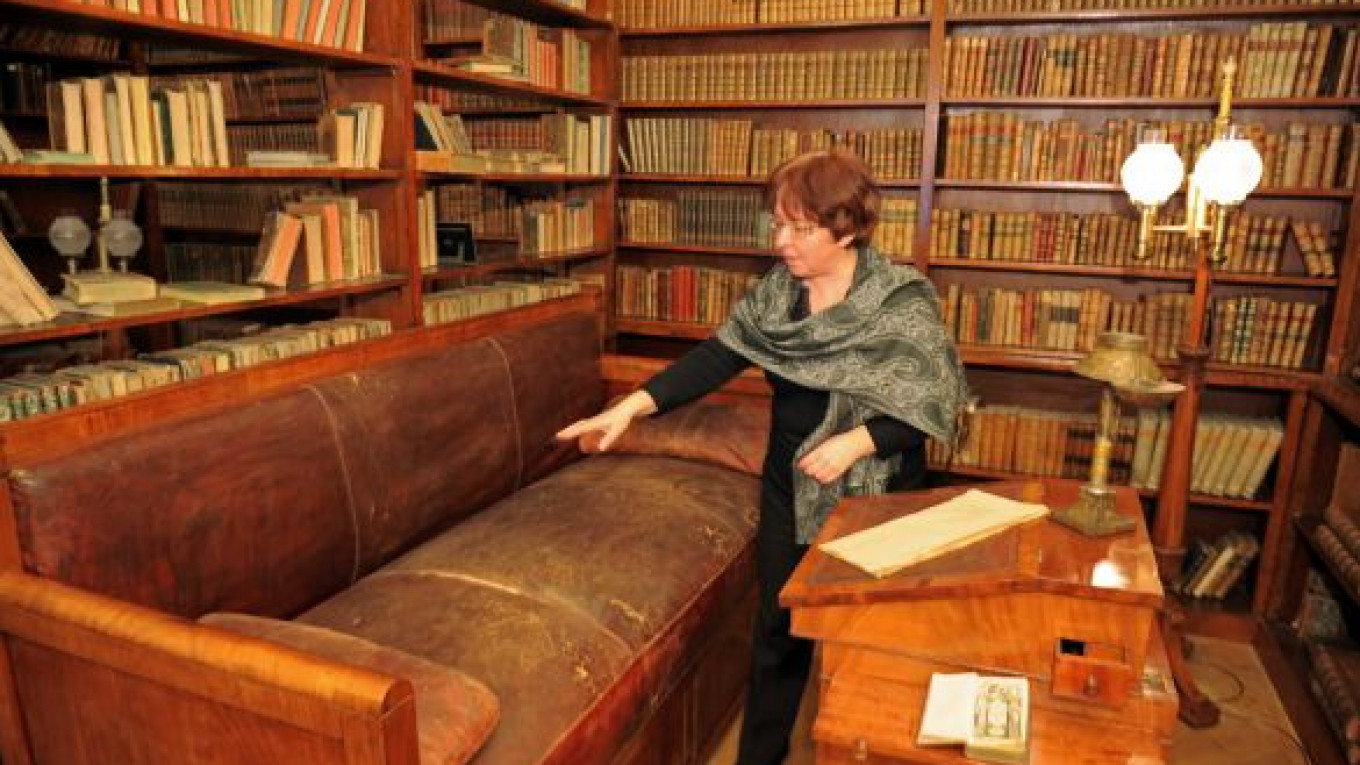“The results of our medical research allow us to state that it is the poet’s blood on this historic sofa,” Yury Molin, deputy head of the Leningrad region’s legal and medical department, said at a news conference in the city’s Pushkin Apartment Museum earlier this month.
Pushkin died on Feb. 10, 1837, at the age of 37, after a duel with the French-born Georges d’Anthes. He was shot in the stomach and died at his home on the Moika River, now the Pushkin Apartment Museum, two days later.
Research proved that the blood on the sofa was located on the exact spot where Pushkin’s wound have been bleeding.
“For that purpose the researchers put a paper model of Pushkin’s body on the sofa, and then put the waistcoat Pushkin was wearing during his fatal duel on the model. The bloodstains on the waistcoat matched the place where the bloodstains were found on the sofa,” Molin said.
Secondly, experts ascertained that the blood on the sofa and the waistcoat came from a male belonging to Blood Type A and that both bloodstains had been there for many decades.
Molin said the scientists had also tried to conduct more detailed analysis of the bloodstains, including DNA and spectrum tests. However, the condition of the blood and the need to treat the samples very carefully because of their historical value made additional tests impossible.
“We could cut out a piece of the sofa to conduct a thorough analysis in a special lab, but neither we nor the museum would treat a historical relic like that,” Molin said.
“Nor could we do much to the waistcoat, so we just put a compress on it to absorb some blood from it in order to at least establish the blood type,” he said.
Molin said the results of the research could be seen as “indirect” because of the absence of DNA results, but that nevertheless the results from the available methods proved that it was the blood of one of Russia’s best-loved historic figures.
The other aim of the analysis, according to Molin, was to establish whether or not the medical treatment given to Pushkin at his home was appropriate and whether he would have survived had he been taken to a hospital, Interfax reported.
Molin said the results of the tests proved that taking Pushkin to a hospital would not have saved his life, because the level of help that the hospital doctors could have offered the poet was no higher than that provided by the family doctors.
Galina Sedova, head of the Pushkin Apartment Museum, said staff at the museum “were first struck when Pushkin’s blood was found on the sofa at their museum,” and then “deeply impressed by the results and the work of the forensic experts that amounted to a historical sensation.”
Sedova had previously proven the historical authenticity of the sofa itself.
The experts also concluded that the locks of hair kept at the museum had the same morphological characteristics as the blood, allowing them to confirm that the hair samples really did belong to Pushkin.
The leather sofa at the center of the tests has been on display in Pushkin’s study for more than 70 years. Guides giving tours around the museum would invariably say it was where Pushkin died, though some of the museum’s staff had expressed doubts as to whether or not it was the actual sofa on which the poet passed away.
The museum was given the sofa by the State Hermitage Museum in 1937. Earlier still, it had belonged to the Filosofov family, who received it as a gift from the wife of Pushkin’s youngest son, Grigory.
A Message from The Moscow Times:
Dear readers,
We are facing unprecedented challenges. Russia's Prosecutor General's Office has designated The Moscow Times as an "undesirable" organization, criminalizing our work and putting our staff at risk of prosecution. This follows our earlier unjust labeling as a "foreign agent."
These actions are direct attempts to silence independent journalism in Russia. The authorities claim our work "discredits the decisions of the Russian leadership." We see things differently: we strive to provide accurate, unbiased reporting on Russia.
We, the journalists of The Moscow Times, refuse to be silenced. But to continue our work, we need your help.
Your support, no matter how small, makes a world of difference. If you can, please support us monthly starting from just $2. It's quick to set up, and every contribution makes a significant impact.
By supporting The Moscow Times, you're defending open, independent journalism in the face of repression. Thank you for standing with us.
Remind me later.


